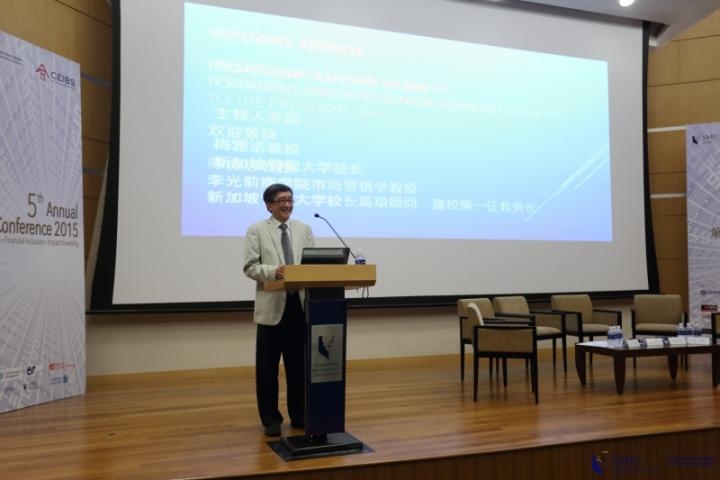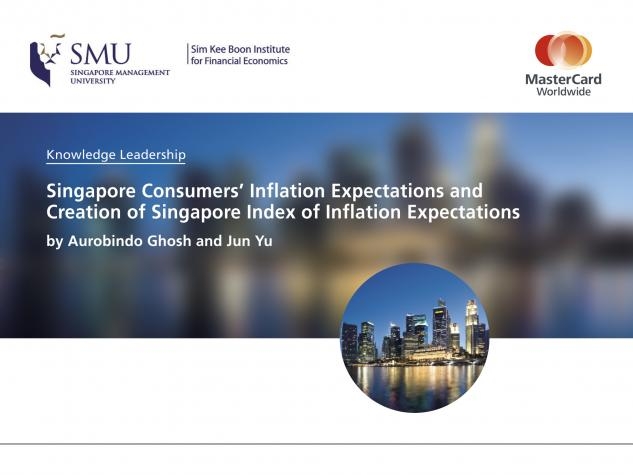Singapore consumers are expecting inflation to ease in the next one to five years, according to a survey by the Singapore Management University (SMU) and MasterCard.
According to the latest findings of the SKBI-MasterCard Singapore Index of Inflation Expectations (SInDEx), which was jointly developed by the Sim Kee Boon Institute for Financial Economics at SMU (SKBI) and MasterCard, Singapore consumers are expecting inflation to continue on a downward trend in the next one to five years in Singapore and the region. This is partly due to moderation in imported inflation owing mainly to subdued demand and weak growth in regional economies such as China and India.
The Singapore Index of Inflation Expectations (SInDEx) developed by the Sim Kee Boon Institute for Financial Economics at SMU (SKBI) and MasterCard indicated that the public expects inflation of 3.92 per cent for the year ahead, down from 3.99 per cent in June. This downward trend is partly due to tepid growth in emerging economies, such as China and India, and to moderating imported inflation. Although the general public expects inflation to decrease, their expectations for inflation are still higher than that forecast by the government. SMU Assistant Professor of Finance (Education) and SKBI Programme Director Aurobindo Ghosh noted that headline inflation has come down from the first quarter of 2013 as a result of a slew of government measures to cool the property market and curb car loans, as well as the deleveraging of household debt – the combined effect of which was not expected a year ago.
According to the latest findings of the Singapore Index of Inflation Expectations (SInDEx), which was jointly developed by SMU Sim Kee Boon Institute for Financial Economics (SKBI) and MasterCard, Singapore consumers are expecting inflation to continue on a downward trend in the next one to five years amid slowdown in big emerging economies like China and Brazil and persistent weakness in the Eurozone. The study found that the headline inflation rate is likely to ease to 3.9 per cent, down from 4.1 per cent recorded in its earlier survey.
“Let’s put mom in the retirement home.”
To a lot of people, especially in Asia where filial piety is still a dominant social force, that is one of the most difficult things for an adult with an aging parent to say. However, it could also be the best thing to do for everyone involved.
Nursing home care is certainly not cheap. Speaking to Perspectives@SMU at a recent CSS Conference, Retirement Readiness: Income adequacy, long-term care and social well-being, Mitchell delivered the bombshell: Nursing home care in the U.S. can cost up to US$100,000 a year.
According to the latest findings of the SKBI-MasterCard Singapore Index of Inflation Expectations (SInDEx), Singapore consumers are expecting inflation to continue on a downward trend in the next one to five years amid slowdown in big emerging economies like China and Brazil and persistent weakness in the Eurozone. SMU Sim Kee Boon Institute for Financial Economics (SKBI) Programme Director and co-creator of the SInDEx, Dr Aurobindo Ghosh, added that macro-prudential policies like cooling measures for the property market and curbs on financing on private transportation, and gradual emphasis on individual deleveraging, seem to have an impact on the public's perception of overall inflation expectations.
According to the findings of the SKBI-MasterCard Singapore Index of Inflation Expectations (SInDEx), Singaporeans predict that inflation would rise more slowly over the next one to five years due to the expected economic slowdown in China and Brazil.

According to the latest poll conducted by the Sim Kee Boon Institute for Financial Economics at SMU (SKBI), Singapore consumers expect inflation to trend downwards. The survey of 400 respondents was conducted online in December 2013. The SKBI-MasterCard Singapore Index of Inflation Expectations (SInDEx) report attributed the decline to property loan curbs, macro-prudential policies as well as weaker imported inflation from ASEAN countries. Consumers' expectations for core inflation, which excludes accommodation and private transportation, also moderated from 3.88 per cent in September to 3.7 per cent in the December survey. Both estimates from the survey are higher than government projections. The Monetary Authority of Singapore expects both headline and core inflation to be in the 2 per cent and 3 per cent range for 2014.

According to the Singapore Index of Inflation Expectations (SInDEx) released on Monday, consumers polled in December expect overall inflation for 2013 to stand at 3.72 per cent. This is lower than their one-year inflation expectation of 3.85 per cent recorded in September, besides being the lowest level recorded since the quarterly index was first produced in September 2011. Explaining why households seem to have higher inflation expectations, Project Director of the Sim Kee Boon Institute for Financial Economics at SMU Assistant Professor of Finance (Education) Aurobindo Ghosh, who co-created the SInDEx, said: "The levels of information available to households, policymakers or professional economists could be quite different. While policymakers and economists are more concerned with the macroeconomic outlook and conditions, individual households base their decisions on past experience and their expectations of possible escalating cost of living, particularly for commonly purchased items.
SUBSCRIBE TO THE SKBI MAILING LIST*
Get updates on SKBI news and forthcoming events.
*Please note that upon providing your consent to receive marketing communications from SMU SKBI, you may withdraw your consent, at any point in time, by sending your request to skbi_enquiries [at] smu.edu.sg (subject: Withdrawal%20consent%20to%20receive%20marketing%20communications%20from%20SMU) . Upon receipt of your withdrawal request, you will cease receiving any marketing communications from SMU SKBI, within 30 (thirty) days of such a request.